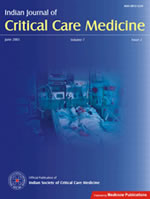
|
Indian Journal of Critical Care Medicine
Medknow Publications on behalf of the Indian Society of Critical Care Medicine
ISSN: 0972-5229
EISSN: 0972-5229
Vol. 14, No. 3, 2010, pp. 109-112
|
 Bioline Code: cm10024
Bioline Code: cm10024
Full paper language: English
Document type: Research Article
Document available free of charge
|
|
|
Indian Journal of Critical Care Medicine, Vol. 14, No. 3, 2010, pp. 109-112
| en |
A case control study of cardiovascular health in chemical war disabled Iranian victims
Rohani, Atoosheh; Akbari, Vahid & Moghadam, Fatemeh Tabesh
Abstract
Background: Sulfur mustard (SM) is an alkylating chemical warfare agent that was widely used during Iran-Iraq war between 1983 and 1988. SM exposure leads to various late complications. The aim of this study was to determine the late cardiovascular effects of SM in war-disabled Iranian victims.
Materials and Methods: This was a retrospective cohort case control study on 50 patients with symptoms of SM exposure and 50 cases who had been in Iran-Iraq war, without chemical injury. We performed exercise stress test and echocardiography for all of patients.
Results: The study group comprised 100 males of mean age 45.6 ± 6.2 years. In chemical war injury group, two patients (4%) had positive exercise stress test. On coronary angiography, they were found to have coronary artery disease. One patient had severe mitral regurgitation and normal coronary angiography; he was referred for mitral valve replacement. Left ventricular (LV) diastolic abnormality was detected in 23% of these subjects. In another group, 5% had LV diastolic abnormality (P = 0.02) and all of them had normal stress test.
Conclusions: Cardiovascular abnormalities are another late complication in chemical war disabled Iranian victims. Diastolic dysfunction was the most common abnormality in both groups of patients.
Keywords
Cardiovascular abnormalities, chemical warfare, mustard gas
|
| |
© Copyright 2010 Indian Journal of Critical Care Medicine.
Alternative site location: http://www.ijccm.org/
|
|
